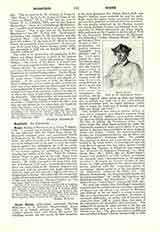

Roger, Bishop of Worcester, d. at Tours, August 9, 1179. A younger son of Robert, Earl of Gloucester, he was educated with the future king, Henry II, afterwards ordained priest, and consecrated Bishop of Worcester by St. Thomas of Canterbury, August 23, 1163. He adhered loyally to St. Thomas, and though one of the bishops sent to the pope to carry the king’s appeal against the archbishop, he took no active part in the embassy, nor did he join the appeal made by the bishops against the archbishop in 1166, thus arousing the enmity of the king. When St. Thomas desired Roger to join him in his exile, Roger went without leave (1167), Henry having refused him permission. He boldly reproached the king when they met at Falaise in 1170, and a reconciliation followed. After the martyrdom of St. Thomas, England was threatened with an interdict, but Roger interceded with the pope and was thereafter highly esteemed in England and at Rome. Alexander III, who frequently employed him as delegate in ecclesiastical causes, spoke of him and Bartholomew, Bishop of Exeter, as “the two great lights of the English Church“.
EDWIN BURTON

